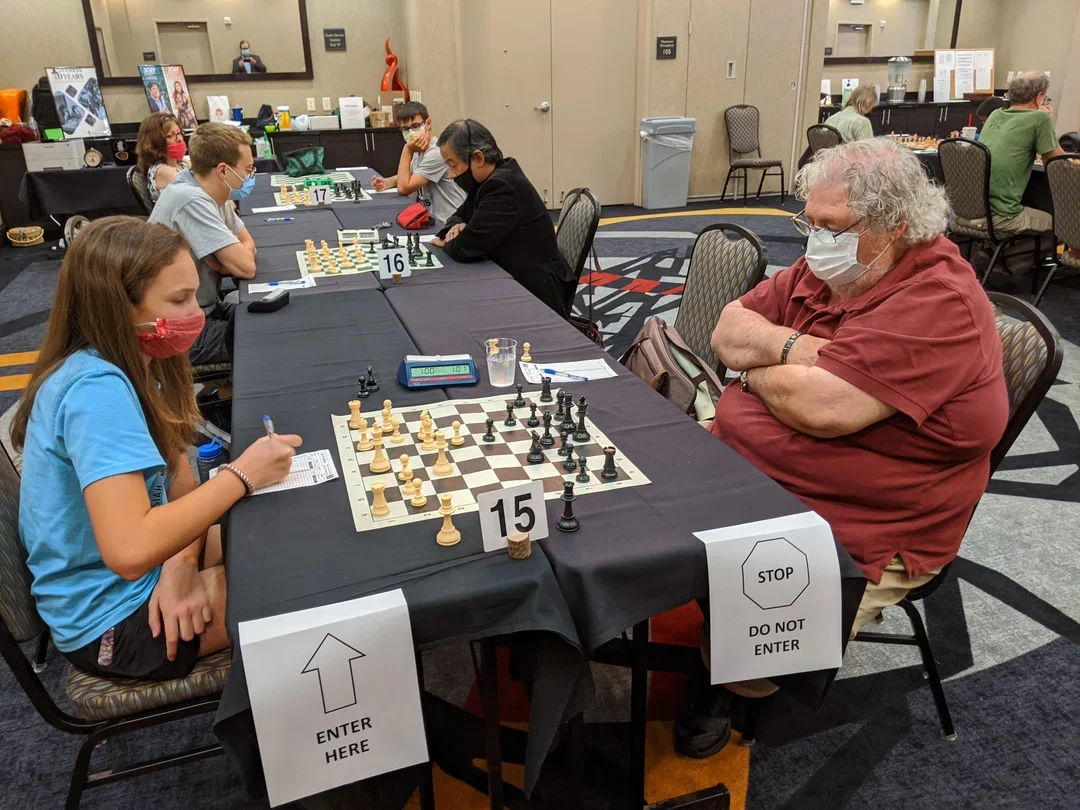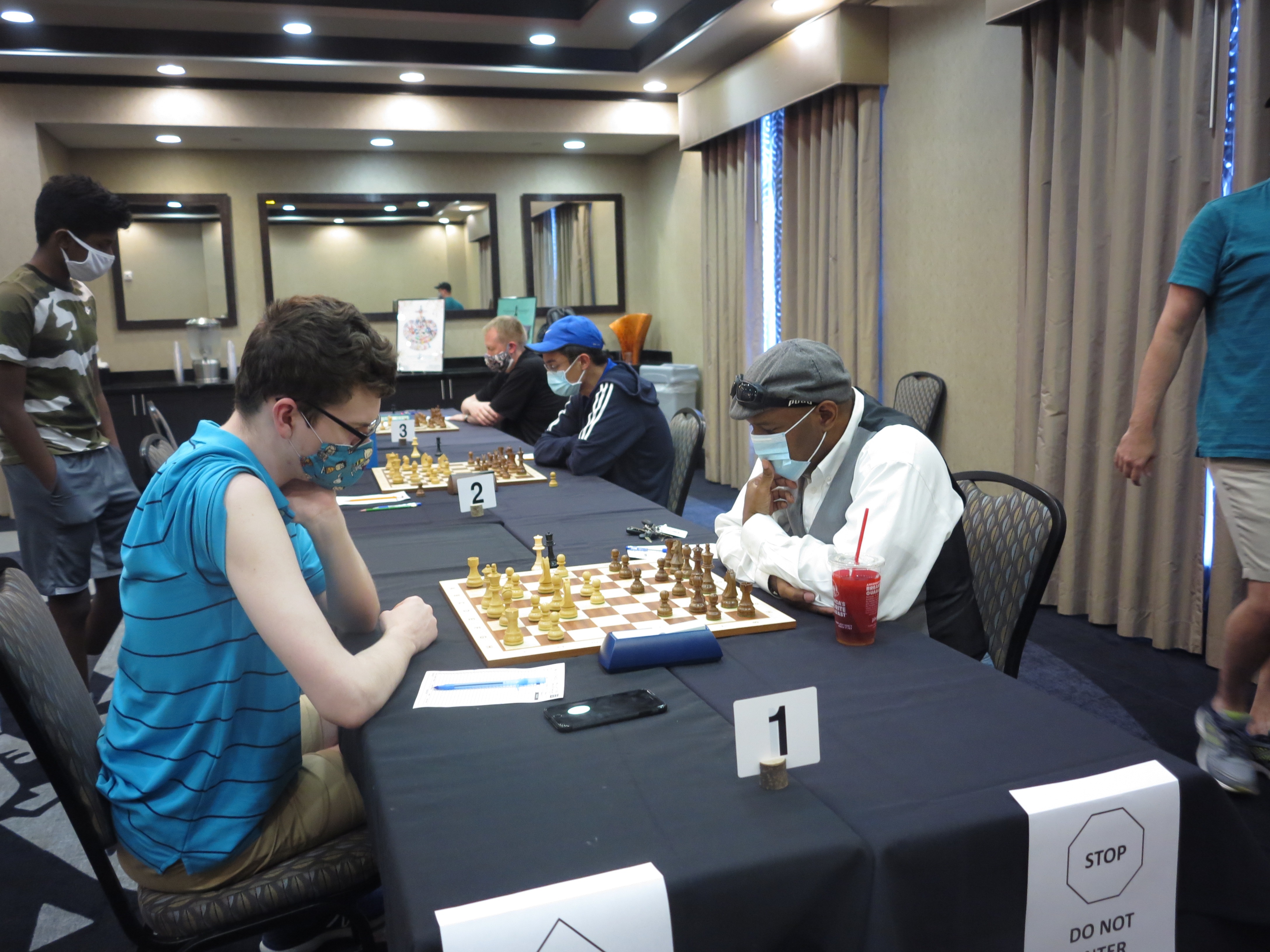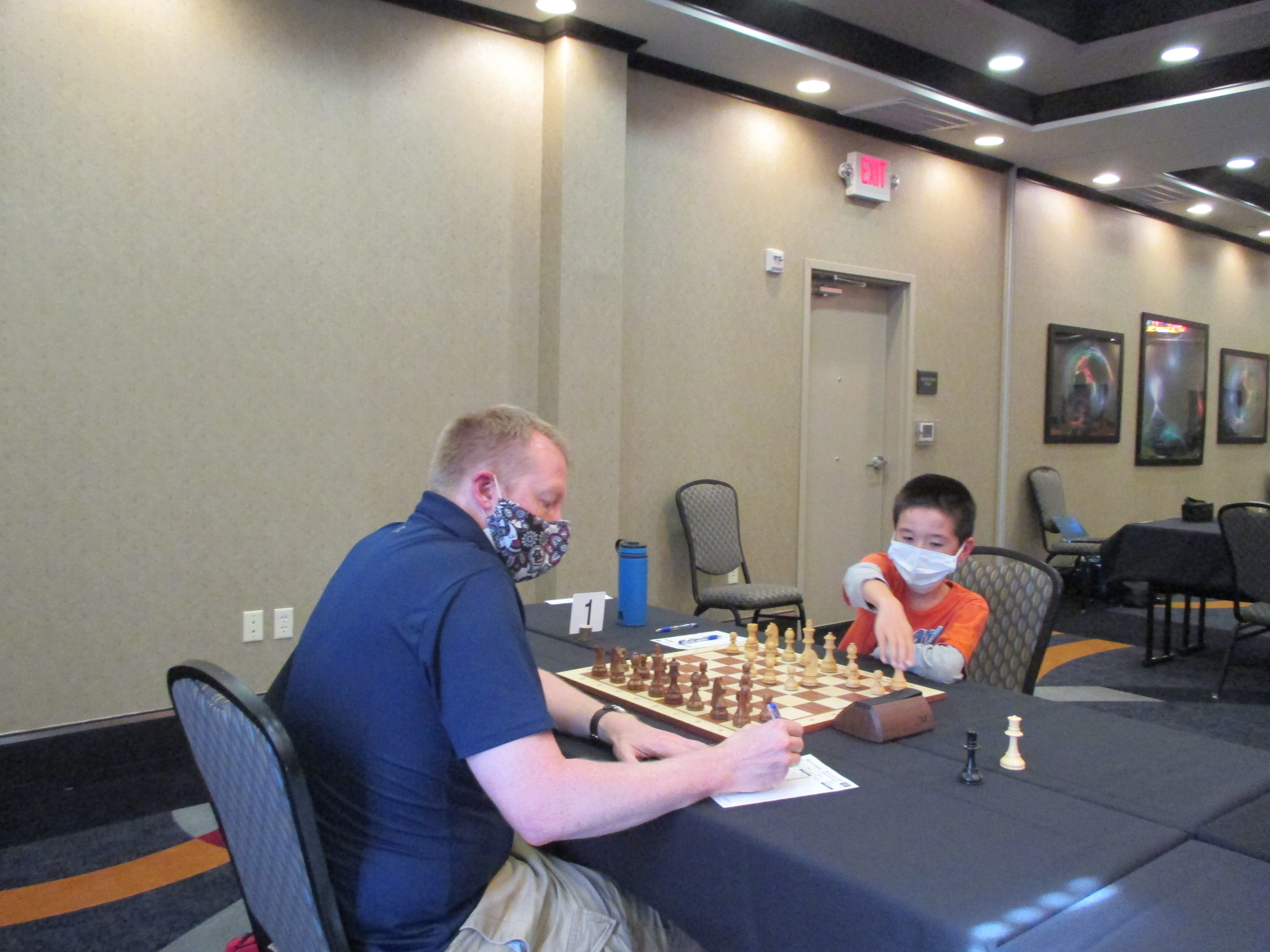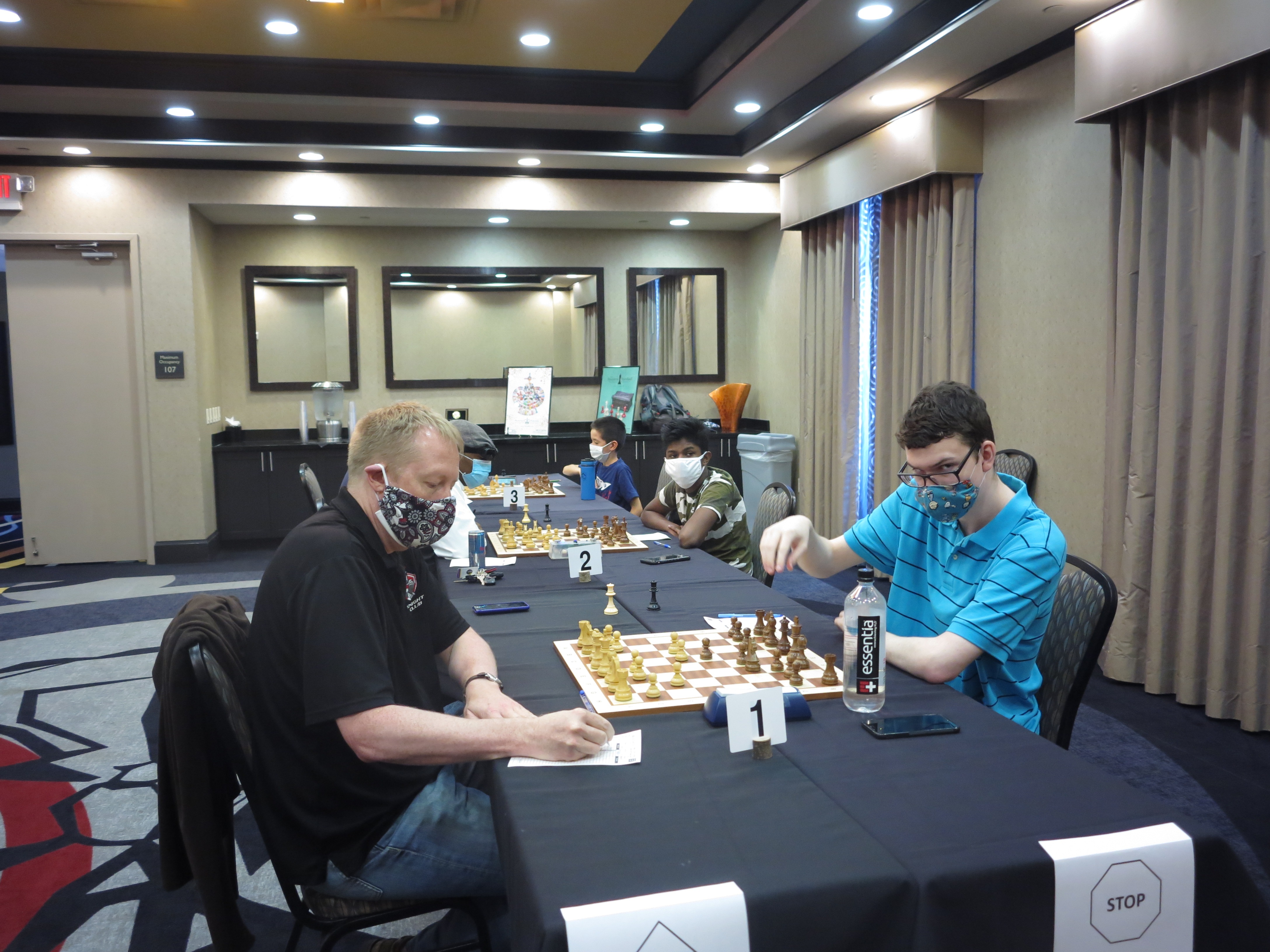The third annual Queen City of the Prairie Open and Fort Worth Championship was held over-the-board July 18-19 in Fort Worth, Texas. The highest-finishing Fort Worth resident, Curtis Fukuchi, scored 3 points out of 5 and earned the Fort Worth Champion plaque. The Open section winner, Ryan Amburgy, a 16-year-old from Tulsa, Oklahoma, went 5-0 and got $262.50.
The Queen City of the Prairie Open and Fort Worth Championship was my first over-the-board US Chess-rated tournament since the pandemic began. I had signed up in February, pre-pandemic, after being in touch with the tournament’s organizer and director, Louis A. Reed, Jr. After paying my entry fees for the first two “Queen City of the Prairie Opens,” Reed gave me a free entry this time around.
But my free entry wasn’t for my two past years of loyalty. For the 2020 tournament, the first three players with the CM, WIM, or WFM titles got free entries, with the proviso that the entry fee would be deducted from any prize money. Only two titled players claimed the free-entry offer – CM Tim Steiner was the other.
FIDE Ratings
Some may be wondering why Reed offered free entry for specifically these three FIDE titles. His idea was to attract players with lesser FIDE titles and FIDE ratings below 2200, i.e., players like me! But why?
Reed wanted to rate as many games as possible with FIDE, so he also offered a $5 rebate to FIDE-rated players below 1600. Because of the G/60 (plus 30 seconds increment) time control, any game featuring a player rated 2200 or higher would not have been rated by FIDE. Finding enough players who were FIDE rated, but not too highly rated, was the goal.
For those interested in the nitty-gritty details on how this works, Reed emailed the following explanation:
This regulation is from the FIDE Rating Regulations(B02).
“1. Rate of Play
1.1 For a game to be rated each player must have the following minimum periods in which to complete all the moves, assuming the game lasts 60 moves. Where at least one of the players in the game has a rating 2200 or higher, each player must have a minimum of 120 minutes.
Where at least one of the players in the game has a rating 1600 or higher, each player must have a minimum of 90 minutes.
Where both of the players in the game are rated below 1600, each player must have a minimum of 60 minutes.”
Since the game is assumed to be 60 moves (as per FIDE Rating Regulations 1.1) then the 30 second increment becomes an additional 30 minutes of playing time upon reaching the 60th move thereby achieving the minimum 90 minutes of allocated per player playing time. Even if the game does not actually reach 60 moves, the FIDE requirements have been met.
Where both of the players in the game are rated below 1600, each player must have a minimum of 60 minutes. These regulations are outlined on page 90 of the 2020 FIDE Arbiters' Manual.
There are two additional subtleties which I would like to point out in regard to the structuring of the tournament.
- FIDE requires a minimum 1/2 point to be scored in five FIDE rated games in order to earn a FIDE rating. That is primarily why I chose the tournament to be five rounds.
- I am offering players with a FIDE rating of under 1600, but not FIDE unrated, a $5 entry fee rebate if they play all five rounds.
Having multiple players with a sub-1600 FIDE rating will allow some of the FIDE unrated players a shot at earning a FIDE rating if they score at least a 1/2 point. All of these rules all fall under the aforementioned FIDE Rating Regulations (primarily 6.3, 6.31, 7.14 and 7.14a).
Open and Reserve
My FIDE title is WIM and my FIDE rating is 2025, which meant I had the highest FIDE rating of anyone in the tournament. However, my floored 2000 US Chess rating ranked seventh at the start of the tournament’s Open section.
At the top of the pre-tournament wallchart was Andy Woodward, who turned 10 years old in May. Woodward’s pre-tournament US Chess rating was 2169 and his FIDE rating was 1856. In round 1, Woodward played on board 1 in the 29-player Open section. In round 2, Woodward defeated me (as Black) but then he lost as White in round 3 to last year’s champion, CM Tim Steiner. Steiner lost in round 4 to Ryan Amburgy. Amburgy then won against Shaun Graham in the fifth and final round. Round-by-round pairings for the Open, which used FIDE pairing rules, are available at Chess-Results.com.
Reed’s wife Wendy is also a tournament director, though at this tournament she played in the six-player Reserve section. The Reserve section was limited to players rated under 1200 in the US Chess rating system. The winner of the Reserve section was 13-year-old Morgan Chryst, who won $70 for her 4 out of 5 points.

Chess is My Death?
This tournament was one of the first over-the-board tournaments played since the emergence of COVID-19 on our shores. The pandemic was that proverbial elephant in the room, looming while we played our games.
In addition to enforcing face-covering, based on a Tarrant County Executive Order, Reed took other safety precautions detailed in this Facebook posting. Nonetheless, I still worried about safety. Before the tournament, I recalled the book title Chess is My Life, used for both Korchnoi’s autobiography and a book about Karpov. I wondered if a book title about playing offline during a pandemic would be Chess is My Death.
During the tournament, I did not hesitate to tattle to Reed whenever I saw players covering their mouths, but not their noses, with their face coverings. One player consistently wore his mask under his nose or chin, perhaps using this Executive Order exception for medical conditions: “The requirement of a face covering does not apply if covering the nose and mouth poses a significant mental or physical health risk to the individual.” I hoped that I would not be paired with, or near, that player. Nonetheless, his exhalations likely circulated throughout the playing site.
“Nearer My God To Thee,” as played by quartet of musicians in the movie Titanic, was my pre-tournament soundtrack. One freelance journalist, Steve Turner, wrote that the Titanic quartet played, even as the ship sank, because its leader, violinist Wallace Hartley, “believed that music could prevent panic and create calm.” Before the July 18-19 tournament, I wished that playing over-the-board chess games would feel calm.
During the tournament, many players thanked Reed for organizing it. William Wenz, from Wisconsin, was particularly grateful. He is about halfway through playing one US Chess-rated tournament in each of the 50 states. The third annual Queen City of the Prairie Open and Fort Worth Championship crossed Texas off his list.
Games and Crosstables
The games Root-Woodward (Round 2), Woodward-Steiner (Round 3), Steiner-Amburgy (Round 4), and Amburgy-Graham (Round 5) were critical to who finished at the top of the Open section.
[pgn][Event "Prairie"] [Site "?"] [Date "2020.07.18"] [Round "2"] [White "Root, Alexey"] [Black "Woodward, Andy"] [Result "0-1"] [ECO "D45"] [WhiteElo "2000"] [BlackElo "2169"] [Annotator "Alexey Root"] [PlyCount "126"] [EventDate "2020.??.??"] 1. d4 d5 2. Nf3 Nf6 3. e3 e6 4. c4 c6 5. Nc3 a6 6. Bd3 dxc4 7. Bxc4 b5 8. Bb3 c5 9. dxc5 Qxd1+ 10. Bxd1 Bxc5 11. a3 Bb7 12. b4 Bd6 13. Bb2 {I offered a draw here.} Nbd7 14. O-O Ke7 15. Be2 Rac8 16. Rac1 Rhd8 17. Nb1 h6 18. h3 g5 19. Rxc8 Rxc8 20. Rc1 Rg8 21. Nd4 Ne5 22. Nd2 g4 23. hxg4 Nfxg4 {Fritz recommends e4, and I agree. I later ended up playing e4, but it would have been more effective now.} 24. N2f3 h5 25. Nxe5 Nxe5 26. f3 Bd5 27. e4 Bb7 28. Nb3 Ng6 29. Kf2 Nf4 30. Bf1 {Fritz states I have a small advantage here, but I felt as if my kingside was under pressure.} e5 31. Nc5 Bc8 32. g3 {I offered a draw here too. I was still hoping this would be a short 2nd round game on a 3-round Saturday, but this game ended up being one of the last games going.} Ne6 33. Nxe6 Bxe6 34. Rc6 Rc8 35. Rxc8 Bxc8 36. Ke3 Bc7 37. f4 Bb6+ 38. Kf3 Bg4+ 39. Kg2 exf4 40. gxf4 h4 41. Bc1 Kf6 42. Kh2 Ke6 43. Bh3 f5 44. exf5+ Kxf5 45. Bg2 Bc7 46. Bb7 Bxf4+ 47. Bxf4 Kxf4 48. Bxa6 Bd7 49. Bb7 Ke3 50. Kg2 (50. Ba6 Kd4 51. Bxb5 Bxb5 52. Kh3 {This is where I missed my chance to draw this game. This variation is a dead draw.}) 50... Kd4 51. Kf3 Kc3 52. Ke3 Kb3 53. Kd4 Kxa3 54. Kc5 h3 55. Bh1 Kb3 56. Bd5+ Kc3 57. Bh1 Bg4 58. Kxb5 Be2+ 59. Kc5 Bf1 60. b5 Bg2 61. Bxg2 hxg2 62. b6 g1=Q+ 63. Kc6 Qg3 {And I resigned.} 0-1 [/pgn]
[pgn][Event "Prairie"] [Site "?"] [Date "2020.07.18"] [Round "3"] [White "Woodward, Andy"] [Black "Steiner, Tim"] [Result "0-1"] [WhiteElo "2169"] [BlackElo "2040"] [Annotator "Alexey Root"] [PlyCount "130"] [EventDate "2020.??.??"] 1. d4 d5 2. c4 e6 3. Nc3 c6 4. e4 dxe4 5. Nxe4 Bb4+ 6. Bd2 Qxd4 7. Bxb4 Qxe4+ 8. Ne2 Na6 9. Bf8 Ne7 10. Bxg7 Nb4 11. Qd6 Nd3+ 12. Kd2 Nf5 13. Qxd3 Qxd3+ 14. Kxd3 Nxg7 15. Nc3 e5 16. Re1 Bf5+ 17. Kd2 O-O-O+ 18. Kc1 f6 19. Be2 Ne6 20. Rd1 Rd4 21. Rd2 Nf4 22. Rhd1 Nxe2+ 23. Rxe2 Rxc4 24. Rd6 Rf8 25. Re3 Rd4 26. Rxd4 exd4 27. Rf3 Bg6 28. Nb1 Re8 29. Na3 Re6 30. g4 b6 31. h4 Kd7 32. h5 Be4 33. Rf4 c5 34. Kd2 h6 35. Nc4 b5 36. Na3 Kd6 37. f3 (37. Nxb5+ Ke5 {Trapping the R. }) 37... Bh7 38. g5 hxg5 39. Rg4 Kc6 40. h6 a5 41. Nc2 Bxc2 42. Kxc2 Re2+ 43. Kc1 Rh2 44. f4 Rxh6 45. fxg5 Rg6 46. Rf4 fxg5 47. Rg4 Kd5 48. Kc2 Ke5 49. a3 a4 50. b3 axb3+ 51. Kxb3 c4+ 52. Kc2 d3+ 53. Kc3 Kf5 54. Rd4 g4 55. Rd5+ Ke4 56. Rxb5 g3 57. Rb1 g2 58. Rg1 Ke3 59. Kxc4 d2 60. Kc3 Rc6+ 61. Kb2 Rc1 62. Rxg2 d1=Q 63. a4 Rb1+ 64. Ka3 Qd3+ 65. Ka2 Qb3# 0-1 [/pgn]
[pgn][Event "Prairie"] [Site "?"] [Date "2020.07.19"] [Round "4"] [White "Steiner, Tim"] [Black "Amburgy, Ryan"] [Result "0-1"] [WhiteElo "2040"] [BlackElo "2133"] [PlyCount "80"] 1. d4 Nf6 2. c4 e6 3. g3 d5 4. Bg2 Bb4+ 5. Bd2 Bd6 6. Nf3 O-O 7. O-O c6 8. b3 Nbd7 9. Bc3 Ne4 10. Bb2 f5 11. Nbd2 b6 12. Ne5 Nxe5 13. dxe5 Bc5 14. Nxe4 fxe4 15. Bd4 Qg5 16. f4 exf3 17. exf3 Qxe5 18. Bxc5 bxc5 19. f4 Qf6 20. Qc2 Ba6 21. Rac1 Rab8 22. Rfd1 Rfc8 23. Qf2 dxc4 24. bxc4 Rb2 25. Qxc5 Rxa2 26. Rd4 Qf8 27. Qe5 Qf7 28. Qc5 Qc7 29. Re1 Ra5 30. Qd6 Qxd6 31. Rxd6 Bxc4 32. Bh3 Rc7 33. Bxe6+ Bxe6 34. Rexe6 c5 35. f5 c4 36. g4 c3 37. Re8+ Kf7 38. Rdd8 c2 39. Rf8+ Ke7 40. Rfe8+ Kf6 {And White resigned.} 0-1 [/pgn]
[pgn][Event "Prairie"] [Site "?"] [Date "2020.07.19"] [Round "5"] [White "Amburgy, Ryan"] [Black "Graham, Shaun"] [Result "1-0"] [WhiteElo "1846"] [BlackElo "1813"] [PlyCount "79"] 1. d4 g6 2. e4 Bg7 3. Nc3 d6 4. Nf3 a6 5. a4 b6 6. Be3 e6 7. Qd2 Bb7 8. Bd3 Nd7 9. h3 h6 10. O-O Ne7 11. Rad1 Nf6 12. Nh2 d5 13. f3 Qc8 14. Ng4 h5 15. Nxf6+ Bxf6 16. Ne2 c5 17. c3 c4 18. Bc2 Qd7 19. Bg5 Bxg5 20. Qxg5 Bc6 21. Qf6 Rf8 22. Ra1 Ng8 23. Qf4 O-O-O 24. Rfb1 Qc7 25. e5 Ne7 26. b3 f6 27. bxc4 g5 28. Qg3 h4 29. Qg4 f5 30. Qxg5 Rh8 31. c5 bxc5 32. dxc5 Qxe5 33. Nd4 Rdg8 34. Qxe7 Rxg2+ 35. Kxg2 Qg3+ 36. Kf1 Qxh3+ 37. Ke2 Re8 38. Qd6 Qg2+ 39. Kd3 Bb7 40. c6 {And Black resigns.} 1-0 [/pgn]
Ultimately, Amburgy won the Open (5-0), Woodward was second (4-1), and Steiner, Graham, and I, along with Sharvesh Deviprasath and Jim Hollingsworth, were in a five-way tie for 3-7 places, scoring 3.5-1.5.
Crosstables:
Categories
Archives
- January 2026 (8)
- December 2025 (27)
- November 2025 (29)
- October 2025 (39)
- September 2025 (27)
- August 2025 (29)
- July 2025 (43)
- June 2025 (25)
- May 2025 (24)
- April 2025 (29)
- March 2025 (29)
- February 2025 (20)
- January 2025 (24)
- December 2024 (34)
- November 2024 (18)
- October 2024 (35)
- September 2024 (23)
- August 2024 (27)
- July 2024 (44)
- June 2024 (27)
- May 2024 (31)
- April 2024 (51)
- March 2024 (34)
- February 2024 (25)
- January 2024 (26)
- December 2023 (29)
- November 2023 (26)
- October 2023 (37)
- September 2023 (27)
- August 2023 (37)
- July 2023 (47)
- June 2023 (33)
- May 2023 (37)
- April 2023 (45)
- March 2023 (37)
- February 2023 (28)
- January 2023 (31)
- December 2022 (23)
- November 2022 (32)
- October 2022 (31)
- September 2022 (19)
- August 2022 (39)
- July 2022 (32)
- June 2022 (35)
- May 2022 (21)
- April 2022 (31)
- March 2022 (33)
- February 2022 (21)
- January 2022 (27)
- December 2021 (36)
- November 2021 (34)
- October 2021 (25)
- September 2021 (25)
- August 2021 (41)
- July 2021 (36)
- June 2021 (29)
- May 2021 (29)
- April 2021 (31)
- March 2021 (33)
- February 2021 (28)
- January 2021 (29)
- December 2020 (38)
- November 2020 (40)
- October 2020 (41)
- September 2020 (35)
- August 2020 (38)
- July 2020 (36)
- June 2020 (46)
- May 2020 (42)
- April 2020 (37)
- March 2020 (60)
- February 2020 (38)
- January 2020 (45)
- December 2019 (34)
- November 2019 (35)
- October 2019 (42)
- September 2019 (45)
- August 2019 (56)
- July 2019 (44)
- June 2019 (35)
- May 2019 (40)
- April 2019 (48)
- March 2019 (61)
- February 2019 (39)
- January 2019 (30)
- December 2018 (29)
- November 2018 (51)
- October 2018 (45)
- September 2018 (29)
- August 2018 (49)
- July 2018 (35)
- June 2018 (31)
- May 2018 (39)
- April 2018 (31)
- March 2018 (26)
- February 2018 (33)
- January 2018 (30)
- December 2017 (26)
- November 2017 (24)
- October 2017 (30)
- September 2017 (30)
- August 2017 (31)
- July 2017 (28)
- June 2017 (32)
- May 2017 (26)
- April 2017 (37)
- March 2017 (28)
- February 2017 (30)
- January 2017 (27)
- December 2016 (29)
- November 2016 (24)
- October 2016 (32)
- September 2016 (31)
- August 2016 (27)
- July 2016 (24)
- June 2016 (26)
- May 2016 (19)
- April 2016 (30)
- March 2016 (36)
- February 2016 (28)
- January 2016 (32)
- December 2015 (26)
- November 2015 (23)
- October 2015 (16)
- September 2015 (28)
- August 2015 (28)
- July 2015 (6)
- June 2015 (1)
- May 2015 (2)
- April 2015 (1)
- February 2015 (3)
- January 2015 (1)
- December 2014 (1)
- July 2010 (1)
- October 1991 (1)
- August 1989 (1)
- January 1988 (1)
- December 1983 (1)












